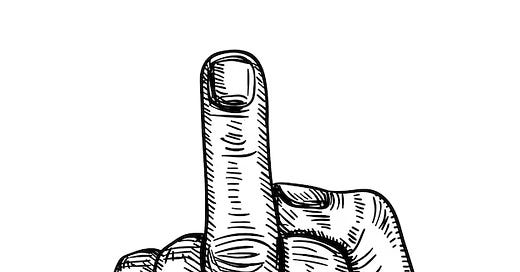My Dear Granddaughter,
In my last letter to you, I wrote about what I called giddy dread—a fear of big bad things about to happen and a wish it would just go ahead and happen already. I did so in the context of Europe on the eve of the First World War, amid some doubts that I’ve been on the right track, as the best way to convey to you the way the world feels to me in your early infancy.
Now, I realize that the things that Upstanding Informed Citizens like me consider portents of dark things to come—the current war in Ukraine, for example, or a quietly intensifying threat of a Communist Chinese takeover over the long-coveted island of Taiwan, or the ominous situation involving nuclear weapons in Iran—may seem in retrospect come to seem like little more than epiphenomenal moments, much the Morocco crisis of 1906 seemed to some at the time like a huge conflagration in the making. (It wasn’t, but is usually cited in discussions of the conflagration that really did happen in 1914.) And I’ve already told you that some of us are temperamentally inclined in such a way. But even taking these things into account, I get the sense now that my mood is shared in a way I don’t always feel.
When I try to think about the roots of this current moment, my mind turns, like that of many other people, to 2016, when the man who was president on the day you were born first got elected. There are a number of ways to interpret this event, but to my mind the underlying impetus for tens of millions of voters was impatience—a sense that the way things had been going was dismaying or frustrating, that that it was time to make a change by choosing a person we all knew was new in this context. Some of that impatience was rooted in the events of the previous decade, notably a financial crisis in which those who caused it went unpunished, and those who suffered were largely out of view.
Some of that impatience grew out of ennui or boredom. Politics had settled into a set of kabuki rituals in which politicians said predictable things, and took predictable positions, with little meaningful outcome beyond legislative chambers and boardrooms. And that what had started out as a meritocracy had become in fact an aristocracy, in which signifiers of status came to matter much more than actually serving ordinary people, which had always been the moral basis of aristocracy and the meritocracy that presumably replaced it on a sounder basis, even if the moral imperative of both was always honored more in the breach than the observance.
In such an atmosphere, cynicism could seem like a breath of fresh air. Mocking a war hero’s record as a prisoner of war or a television interviewer’s menstrual cycle could seem amusing, bracing, or even exciting—especially when it provoked the outrage of Upstanding Informed Citizens. All the more so when Upstanding Informed Citizens responded by ratcheting up their own standards for correct language and behavior, ostracizing (in the ancient Greek sense of banishing) those who failed to comply. Aristocrats sometimes mistake themselves for democrats when they align themselves against the King, failing to appreciate the degree to which the peasants despise them even more than the King, who sometimes leverages that hatred to his advantage.
To be clear, Leila, I was among those deeply upset by our new leader in ways that went far beyond mere boorishness. His brazenness extended to the operations of our government, in ways that clearly violated the law—not just a particular statute, but the foundational rules and premises constituted in the nation’s founding 250 years before you were born. Soliciting bribes from foreign leaders. Exhorting supporters to riot after he lost an election. Deporting people in defiance of court orders. Rewarding friends and punishing enemies by launching investigations, cutting funding, and personally profiting in ways that were avowedly open, unsullied by the base alloy of hypocrisy. That some of these things were counterproductive even on their own terms—trade policies that boomeranged; attacks on academic institutions that damaged the nation’s technological and military prowess—were beside the point of their gleeful transgression. These are things I regarded as tragic not only on their own terms, sweetheart, but (more importantly) the way they shattered precedents that would likely be exploited by those more determined and vicious than the man in charge when you arrived.
But, of course, that was the point: the precedents themselves had come to seem oppressive. Doing things the way that had always been done. Playing by the same old rules. Saying the same old things. It had all become a shopworn lie
Fuck that.
I imagine that you yourself will someday experience the cathartic thrill of profanity, Leila. It can feel so good to just release anger this way, whether or not you finally decide it’s justified. Most of the time, it’s not. But you’re usually not thinking about the consequences in that moment. And if you do, as likely as not you’re mad enough not to care. Actually, if the underlying issues are not addressed, internally or externally, you’re likely to do it again and again, even to the point of inviting a hostile response. Bring it on. You don’t care. You might even welcome it.
That’s one dimension of what I’m talking about, dear child. I’ll mention a few others before I get to the point of all of this.



